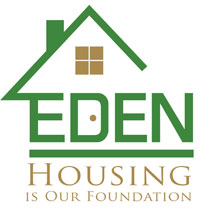While appointments are encouraged, vendors and visitors will be permitted at HQ or any EDEN site. Please call our main line 216-961-9690 for scheduling. | Questions? Email edeninfoEDENcle.org and we will respond.

Our Shared Priority: End Homelessness for Young Adults
 Data confirms that homelessness is a condition that impacts people of color and other minorities at a much higher rate than their representation in the population. Working towards racial equity is an essential part of the mission and values of EDEN and our organization strives to promote racial equity, both among staff and among those we serve.
Data confirms that homelessness is a condition that impacts people of color and other minorities at a much higher rate than their representation in the population. Working towards racial equity is an essential part of the mission and values of EDEN and our organization strives to promote racial equity, both among staff and among those we serve.
EDEN has been participating in a Race Equity Design Lab around young adult homelessness since July, 2017. We are working with FrontLine Service (FLS) and the YWCA to lead the initiative to reduce the over-representation of young adults of color in the homeless system and end their homelessness.
Along with our partners, we have  been developing strategies to understand and address inequities that exist in our work. In 2018, we launched an anonymous agency wide survey and asked both our young adult clients and our staff to reply. We reviewed the responses along with our partner agencies in order to design the framework for us to implement improvements and modify our practices where necessary.
been developing strategies to understand and address inequities that exist in our work. In 2018, we launched an anonymous agency wide survey and asked both our young adult clients and our staff to reply. We reviewed the responses along with our partner agencies in order to design the framework for us to implement improvements and modify our practices where necessary.
Our shared goal is to reduce the over-representation of young adults of color in the homeless system and end their homelessness. We invite you to assist us in this worthy goal.
If you are a homeless young adult
Contact COORDINATED INTAKE (CI). This is a program for individuals and families who are homeless and have nowhere else to sleep at night. It is the front door to emergency shelters within the Continuum of Care, Cuyahoga County's network of shelters and housing programs. CI can help you explore alternatives to emergency shelters, refer you to an emergency shelter if you need it, or refer you to emergency services (such as a hospital, mental health counseling, drug abuse programs, etc.).
Call CI at 216-674-6700 anytime between 8:00 am - 8:00 pm, Monday through Friday. You will need to make an appointment because intake must be done in person. The program is located on the 2nd floor of the Bishop Cosgrove Building at 1736 Superior Avenue.
For other needs, dial 2-1-1 — United Way of Greater Cleveland's First Call for Help program. This is free and confidential 24-hour access to a compassionate professional who will review your needs, work with you to develope a plan, and refer you to nonprofits throughout Cuyahoga County that can help you. First Call for Help will also act as your advocate if you are faced with barriers to service.
Resources
A PLACE FOR ME
YWCA
A Place 4 Me is not an actual place, but rather an idea that all youth ages 14 to 26 will have a place to call home, especially young people experiencing homelessness or transitioning out of the child welfare or other systems. It is an initiative that coordinates the planning and implementation of local efforts to improve outcomes for transition-age youth.
GO LIVE FOR EQUITY
YWCA of Cleveland
Take a deep dive with YWCA Greater Cleveland's President & CEO Margaret Mitchell as she interviews leaders who are doing the hard work to create more equitable communities.
HOMELESS SYSTEM RESPONSE PART 1: EQUITY AS THE FOUNDATION
HUD Exchange
Racial equity is the condition that would be achieved if one's racial identity no longer predicted, in a statistical sense, one's housing, economic, and health outcomes. With racial equity, race would no longer be used to predict outcomes, and outcomes for all groups are improved. Racial equity includes addressing root causes of inequities, not just their outcomes.
LONG-TERM ENGAGEMENTS CREATE LASTING CHANGE
The Equity Lab
Equity Phase I begins with an organization setting intentions, defining its path to equity, and getting an organization on the same page about race, equity, diversity, and inclusion (REDI) work.
RACIAL EQUITY ANALYTICS LAB (REAL)
The Urban Institute
The Urban Institute's Racial Equity Analytics Lab (REAL) equips today's change agents with data and analyses to advance social and economic policies that help remedy persistent structural racism.
CENTERING RACIAL EQUITY IN HOMELESS SYSTEM DESIGN
Oakland-Berkeley-Alameda County Continuum of Care
Centering programs on homelessness as an outcome of structural racism will change how the homeless response system engages homeless people, from frontline services to management to executive decision making. The racial equity lens also clarifies that ending homelessness will require social and structural changes beyond the boundaries of the homeless response system.





